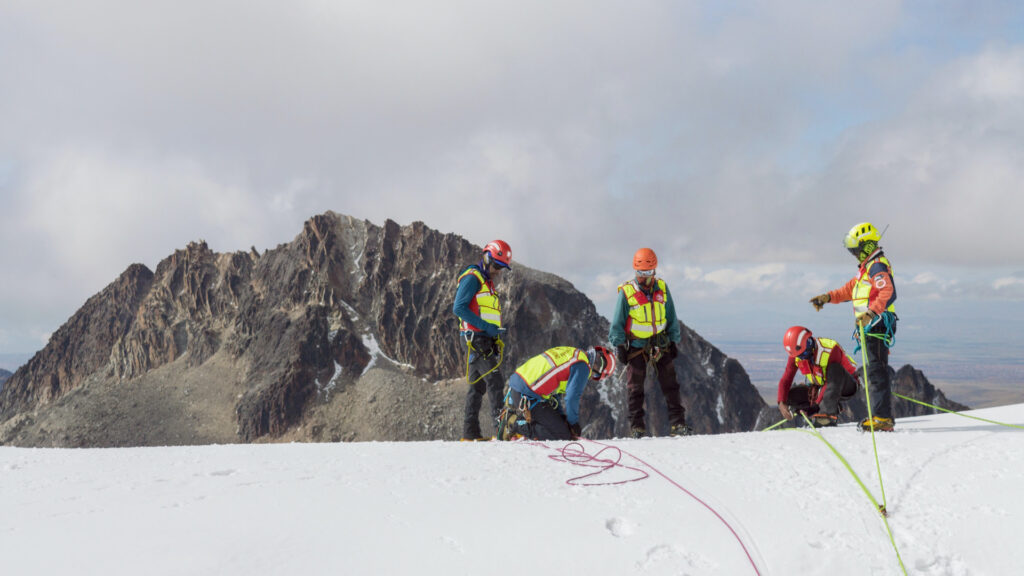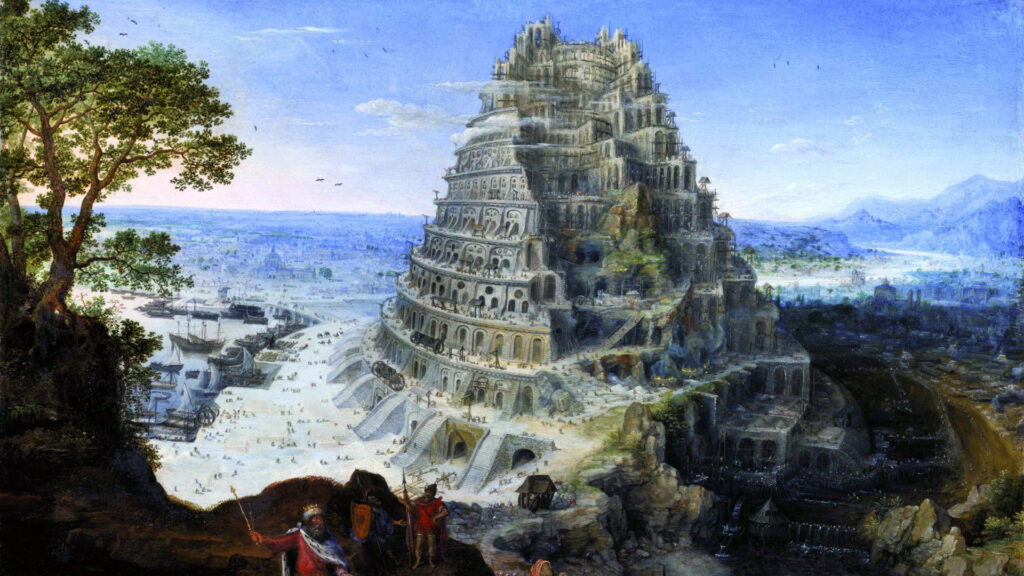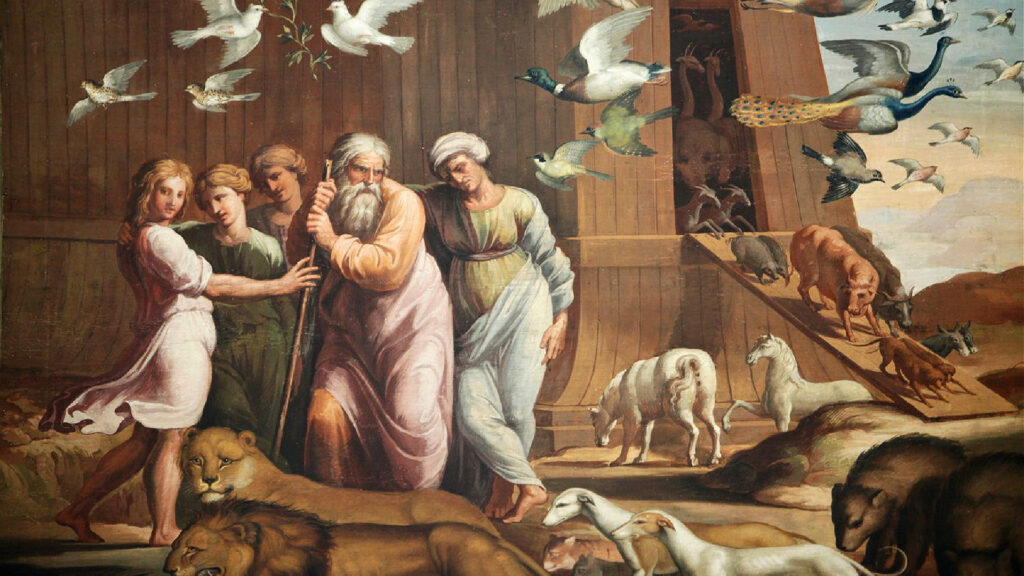Posts by reachchurch
A Daring Rescue
Read This Week: Genesis 14
When Abram heard that his relative had been taken captive, he called out the 318 trained men born in his household and went in pursuit as far as Dan. During the night, Abram divided his men to attack them, and he routed them, pursuing them as far as Hobah, north of Damascus. He recovered all the goods and brought back his relative Lot and his possessions, together with the women and the other people. – Genesis 14:14-16 NIV
Genesis 14 has the feel of an epic action movie. It has all of the elements that we see in a summer blockbuster. It has a hero(es), a villain(s), a revenge plot, fight scenes, and a final showdown. Anyone who thinks the Bible is boring has probably never read it. Narratives like this one, where Abraham and his men make a night rescue of Lot from a group of raiding kings that had just won a battle against another band of kings, is something that you watch on Netflix on a Friday night. It is suspenseful and intriguing and shows us that people of God are sometimes called to stand up and fight for what is right and for their families.
The first part of the chapter gives us a picture of what life was like in Canaan during the time of Abraham. People were developing their cultures and anthropologies, but they were still acting out of their humanity and sin. Many wanted to conquer and dominate those around them to establish dominion and power. The alliance of kings who came against Kedorlaomer (v. 1-12) wanted to be free from his rule, and the Bible tells us that Kedorlaomer formed a coalition of his own to fight back and then eventually overcome not only one but two uprisings. They were done in dramatic fashion, with the second one resulting in the opposing armies falling into tar pits and fleeing to the hills. To add insult to injury, Kedorlaomer and his cohorts seized all the goods of Sodom and Gomorrah and all their food; then they went away (v.11).
Then, a little twist in the story takes us back to last week and the last chapter. In the middle of all this taking of possessions and food, they took Lot, Abraham’s nephew. Now, Abraham is involved in the action. Verse 13 tells us how he received the news when a man who had escaped came and reported this to Abraham the Hebrew. We saw last week that Abraham was an honorable man who loved his extended family and particularly loved Lot. He was also a protector and a guardian, so he had the courage and resolve to do what was difficult and dangerous and fight for his nephew’s life and safety.
When Abraham hears of Lot’s capture and imprisonment, he gathers an army of his own to go after him. Verse 14 says that when Abram heard that his relative had been taken captive, he called out the 318 trained men born in his household and went in pursuit as far as Dan. Abraham had faith in God to give them victory and rescue Lot, but he was wise and prepared. He assembles this small army with his great wealth and arms them to reclaim what had been stolen. Abraham was also daring and fearless as he went in the middle of the night and divided his men to attack the kidnappers and routed them (v.15).
Abraham’s army is victorious over the four kings in battle, but they also bring back all the stuff that was taken while delivering Lot from slavery and death. The Bible says that everyone was rescued, the women and the other people. God had given them success, allowing Abraham to overcome his enemies and defeat evil and violent tyranny. They celebrated and worshiped in honor of the Lord and His delivery of the oppressed. Verses 18-20 share this beautiful picture and tell us that they brought out bread and wine and that the priest of the Most High God, Melchizedek, blessed Abraham and said: Blessed be Abram by God Most High, Creator of heaven and earth. And praise be to God Most High, who delivered your enemies into your hand.
This story of Abraham’s rescue of Lot holds a tremendous spiritual truth for our lives. The lost nephew delivered from the grip of evil and oppression by one who pursued him out of love and a merciful desire to save him is a parallel to the gospel. It is what Christ did for us. Our savior came from a place of eternal security and safety at a great distance, and defeated the enemy and adversary looking to take captive the hearts and lives of those he tormented. It was quite the daring rescue for all the time and we worship Him for it.
Boundaries
Read This Week: Genesis 13
So Abram said to Lot, “Let’s not have any quarreling between you and me, or between your herders and mine, for we are close relatives. Is not the whole land before you? Let’s part company. If you go to the left, I’ll go to the right; if you go to the right, I’ll go to the left.” – Genesis 13:8-9 NIV
In their classic book Boundaries, authors Henry Cloud and John Townsend wrote this about setting boundaries in relationships and life:
Boundaries define us. They define what is me and what is not me. A boundary shows me where I end and someone else begins. Boundaries help us keep the good in and the bad out. Setting boundaries involves taking responsibility for your choices. You are the one who makes them and must live with the consequences.
In Genesis 13, Abraham decides to set some boundaries with his nephew, Lot. They had settled in the land between Bethel and Ai after leaving Egypt and began to flourish and succeed. Verses 2-5 tell us that Abram had become very wealthy, and Lot, who was moving with him, also had flocks, herds, and tents. God began to fulfill His promises to Abraham by allowing him to prosper. He made quite a living from farming livestock and mining silver and gold. His nephew also benefited from his uncle’s favor and had amassed his own wealth. However, as is often the case, their riches became a source of tension and potential strife. Verse 6 tells us that the land could not support them while they stayed together, for their possessions were so great.
Essentially, there was not enough room for both of them in the land. They had accumulated too much to co-exist peacefully. Even their workers and employees started arguing and having issues (v.7). They needed some boundaries to preserve their relationship. Abraham, being the more mature and wiser of the two, approaches Lot and says, let’s not allow this conflict to come between us or our herdsmen. After all, we are close relatives! Abraham recognizes that his relationship with his nephew is more valuable and important than their possessions and land. He doesn’t want to sacrifice the longevity of their bond for a short-term dispute over land and cattle. He chooses to be in the right relationship over being right.
So Abraham sets up some boundaries with Lot that will help them take responsibility for their lives and choices. Boundaries that will prevent further disagreement, unnecessary disputes, and further dissension. He tells Lot in verse 9, the whole countryside is open to you. Take your choice of any section of the land you want, and we will separate. If you want the land to the left, then I’ll take the land on the right. If you prefer the land on the right, then I’ll go to the left. These boundaries will preserve peace and harmony and be a preventative measure for things that could come between them. Even though Abraham has seniority and stature, his plea to Lot is humble and affectionate. He is a man of calm spirit who has self-control and knows how to diffuse a situation and keep it from escalating into something harmful.
This is a tremendous example for our lives. We are to be loving, compassionate, and concerned with living in peace with others. We are to seek reconciliation and harmony and when those are threatened, we are to pursue healthy boundaries that “help keep the good in and the bad out.” We are in the family of God, brothers and sisters that have the same nature, same grace, and same salvation. We are to have great consideration of our relationships to each other, and it should always win out over our possessions, money, and other temporal values. We need God to help us temper our other passions as we strive to love each other and put an end to our contentions in Jesus’ name.
The Blessing
Read This Week: Genesis 12
The Lord had said to Abram, “Go from your country, your people, and your father’s household to the land I will show you. “I will make you into a great nation, and I will bless you; I will make your name great, and you will be a blessing. I will bless those who bless you, and whoever curses you I will curse, and all peoples on earth will be blessed through you.” So Abram went, as the Lord had told him. – Genesis 12:1-4a NIV
When prompted by the voice of God, who among us would leave the only home and area that we’ve ever known and venture out into an unknown world? How many of us would go beyond what we’ve ever experienced and attempt to make a life and home in a place we didn’t even know existed? Who in the modern world would have such faith and trust in the word of God to go sight unseen with your family and all your possessions to a new place and begin again?
People often spend months and years, along with hours and hours of research, before they move anywhere and do anything. But Abraham heard from the Lord in Genesis 12, picked up everything, and followed Him to the land He appointed. A bold move underwritten by an audacious faith. Verse 5 says:
He took his wife Sarai, his nephew Lot, all the possessions they had accumulated, and the people they had acquired in Harran, and they set out for the land of Canaan.
This chapter represents a shift in Genesis, though. Before this section, we have read and worked through the famous stories of ancient biblical history. We’ve unpacked the metaphysical implications of creation, the spiritual ramifications of the fall, and the tragedy and significance of Cain and Abel. We then examined all the Noah and the Flood. But here, even more so than the account of Noah, the story seems to narrow from origins and beginnings to chronicling the life, challenges, and trials of one specific couple, Abraham and Sarah, and their family. The chapter starts with a command from the Lord to go from his country, his people, and his father’s household to the land He would show Him. A promise of transcendent blessing followed this daring direction from God in verses 2-3:
I will make you into a great nation, and I will bless you; I will make your name great, and you will be a blessing. I will bless those who bless you, and all peoples on earth will be blessed through you.
God’s proclamation to Abraham that He will bless him indicates His sovereign, divine plan for his future. Out of that plan will come a blessing for his family to be a great nation. That generations from his seed will be plentiful, prosperous, and abundant. God also asserts that Abraham’s name will be great. His legacy and reputation will be held in esteem, along with the promise that he will bless others. The Lord even included a physical blessing by promising to give Abraham and his family the land He led them to.
God’s blessing of Abraham sustains and preserves him and Sarah through the distinct challenges of their lives (v. 10-20). It also does the same for their descendants when they don’t see its fulfillment. The promise to Abraham establishes him and his descendants as vessels of God’s blessing to all those who would come after. We are beneficiaries of this blessing. Because of Christ, we have received the blessing of salvation through His glorious name. Because of it, we experience more incredible blessings through his grace and provision.
Abraham is a great example for us to follow in this way. He believed in God’s promises and risked for them. He left his father’s house and his home to go to the place that God showed him. He believed in the promised blessing not only for himself but for his family. May we have the same posture towards God and His promises. May we believe they are true, real, and effective for our lives even when life and circumstances may suggest otherwise. That’s the beauty of the blessing.
Scattered
Read This Week: Genesis 10 & 11
These are the clans of Noah’s sons, according to their lines of descent, within their nations. From these, the nations spread out over the earth after the flood. Then they said, “Come, let us build ourselves a city, with a tower that reaches to the heavens, so that we may make a name for ourselves. But the Lord came down to see the city and the tower the people were building. The Lord said, “Come, let us go down and confuse their language so they will not understand each other.” So the Lord scattered them from there over all the earth, and they stopped building the city. – Genesis 10:32 & 11:4-8 NIV
Although it is an easy and tempting thing to do, romanticizing the lives of biblical characters is a mistake. We tend to do this because of how epic and transcendent their stories are and how it makes them seem superhuman. But they were not. They were just people like us who were broken and imperfect but obedient and faithful to the Lord, His word, and what He asked of them. Their belief in a powerful, supernatural God made them unique in the metanarrative, not anything in and of themselves.
We must remember this when thinking about Noah and other figures moving forward in Genesis. What happened at the end of chapter 9 was just an example of Noah, whom God significantly used for an eternal purpose, being a flawed human being. He acted out of his sinful nature and allowed himself to get drunk and be exploited by his son. He messed up, and so did Ham. But even though one moment impacted their lives, it did not define Noah’s life. The most significant thing about his person and legacy was that he found favor in the eyes of the Lord to be worthy to build and captain the ark during the flood and was seen by God as righteous in his generation and admirable to be the seed to replenish the human race on earth.
With this context, chapter 10 lays out the genealogy of Noah’s offspring. Even though Canaan was cursed because his father sinned against Noah, it did not prevent him and Noah’s other children from multiplying greatly and spreading out in the known world to establish civilizations and anthropologies. Verse 32 says these are the clans of Noah’s sons, according to their lines of descent, within their nations. From these, the nations spread out over the earth after the flood.
As we move into chapter 11, we see the establishment of these people groups and nations and how they live and interact. Verses 1-2 tell us about their migration, language, and activities. In verses 1-2, it says that the world now had one language. As people moved eastward, they found a plain in Shinar and settled there. But we also see that even though this is a new generation years removed from the evil, corruption, and immoral behavior that caused the Lord to destroy the earth, sin still prevails in the human heart. Their desire is the same as what happened in the garden; they want to be like God. Verse 4 says they declared: Let us build ourselves a city with a tower that reaches the heavens so that we may make a name for ourselves.
Because they were still sinful, the people of Shinar were similar to Adam and Eve and the people before the flood. They crossed forbidden lines to satisfy their personal and spiritual desires apart from God. They determined at this point that they were on the same plane as God and wanted to build a mezzanine or monument to themselves to worship themselves and their prowess. They wanted to make a name for themselves instead of worshipping the name of Yahweh and who He is. It is a tale as old as time – human beings desiring to be God and living that way. It never works or leads to success. It always leads to poor decisions, chaos, confusion, and being scattered and disconnected.
This disorder and havoc is what happened here at Babel. Verses 5-9 tell us that the Lord came down to see the city and the tower the people were building. Then He says, come, let us go down and confuse their language so they will not understand each other. This language and dialect confusion was effective as the people scattered them from there over the earth, and they stopped building the city. God confused them and bewildered their communication to disrupt their unity around sin and disobedience. The Lord essentially saved them from themselves.
This outcome is not unlike the ones we experience in modern life. We see it in secular culture and Christian culture alike. When we elevate ourselves above God and worship, revere, and glorify men and women more than Jesus, it often leads to destruction for the one desiring worship and disappointment for those who do the worshipping. We observe it in celebrity culture both in the world and in the church. It never ends well. God has to intervene in our lives, save us from ourselves, and turn us to pursuing Him and worshipping Christ, which leads to joy, peace, fulfillment, and eternal purpose.
We all worship something, and in order to find the purpose and meaning that we seek, we must mind what it is that we worship and honor. May we remain faithful to the one true God and the One worthy of worship so we don’t have to be saved from ourselves, scattered by our intentions, or experience the confusion, chaos, and letdown of self-worship.
The Promise
Read This Week: Genesis 9
Then God said to Noah and his sons: “I now establish my covenant with you and with your descendants after you: Never again will the waters of a flood destroy all life; never again will there be a flood to destroy the earth.” And God said, “This is the sign of the covenant I am making between me and you and every living creature with you, a covenant for all generations to come: I have set my rainbow in the clouds, and it will be the sign of the covenant between me and the earth. Whenever the rainbow appears in the clouds, I will see it and remember the everlasting covenant between God and all living creatures of every kind on the earth.” – Genesis 9:8-16 NIV.
A promise is a hopeful thing, a declaration that elicits an anticipation for something good. It is a reason to be encouraged and to garner an expectation of success, commitment, and excellence. A covenant is an agreement between two parties underwritten by a promise to each other. In Genesis 9, we see God’s second covenant and promise with and to man. Before this, there was the Adamic covenant in Genesis 1 and 2, and now we have the Noahic covenant made with Noah and his children on the heels of the Flood. Verses 8-11 say:
Then God said to Noah and his sons: “I now establish my covenant with you and with your descendants after you: Never again will the waters of a flood destroy all life; never again will there be a flood to destroy the earth.”
The word covenant in this passage is the Hebrew word berit and is often associated with community and a coming together of people to have fellowship. But the more preferred meaning of the word is bond, a coming together to form a connection and be bound to one another in agreement. God, in His sovereignty and authority, chooses to approach and come together with Noah and his family to form a bond underlain with a promise never to destroy the earth again and preserve humanity. He also chooses by His good pleasure and out of His grace to signify the covenant with a tangible sign that Noah’s and every generation that comes after will see, remember, and know of His promise. The Lord says in verses 13-16:
I have set my rainbow in the clouds, which will be the sign of the covenant between me and the earth. Whenever the rainbow appears in the clouds, I will see it and remember the everlasting covenant between God and all living creatures of every kind on the earth.
This covenant with Noah is a comprehensive and beautiful picture of the character and nature of God. Not only does He preserve and protect Noah and his family, but He still desires fellowship with them, so He forms a bond with humanity and includes a promise that will last forever. This is our experience with Yahweh as well. He came near us through His Son, Jesus Christ, because of His will and desire to have an intimate relationship with people. The cross formed a new bond, and the resurrection sealed the promise of an abundant life in Him and eternal life in His presence.
Just as the rainbow is the sign of the covenant of God’s grace with Noah, the cross is the sign of His new covenant that we point to as the ultimate symbol of His grace and mercy to us. The Lord’s word and his bond with people endures even though people are still sinful. Later in this chapter, Noah and one of his sons get caught up in sin and make decisions in the flesh that result in a curse. But it did not negate the promise God made to them and their descendants. We enjoy the same promise through the blood of Christ, and is seen in this declaration from Romans 8:1-2 that anticipates something good, assuring, and hopeful for the future:
There is now no condemnation for those who are in Christ Jesus because, through Christ Jesus, the law of the Spirit who gives life has set you free from the law of sin and death.
God Remembers
Read This Week: Genesis 8
But God remembered Noah and all the wild animals and livestock with him in the ark, and he sent a wind over the earth, and the waters receded. By the first day of the first month of Noah’s six hundred and first year, the water had dried up from the earth. Then Noah built an altar to the Lord, and God smelled the pleasing aroma and said in his heart: “Never again will I curse the ground because of humans, even though every inclination of the human heart is evil from childhood. – Genesis 8: 1, 13 & 20-21
In chapter 8, the flood ends because God decides that his will has been accomplished through it. His sovereignty and power are seen again just as in creation as the rain stops and the vast and catastrophic waters covering the whole planet begin to recede. The Bible says that the water steadily went down over a period of time until the tops of the mountains became visible (v.5), and it dried up from the earth (v.13). Verse 14 offers an emphatic stopping point to this natural disaster when it simply states that the earth was completely dry. It was a new day for Noah and his family, the people God chose to reset the human race.
If you have been following along with this story, you want to take a deep breath at this point. It has been an intense narrative from when the Lord called out the wickedness of humanity and decided to flood the earth. The tension is thick throughout the ark construction and the build-up to Noah boarding the boat with the animals. Then, it is further gripping and dramatic as they endure the rising of the waters and the relentless downpours while knowing what is happening to those left behind. The scene of the ark resting on Mt. Ararat as the water retreats is a solace and a metaphor for the calm after the storm. It is a comforting illustration that God remembers us even when we may feel like He is not there.
Verse 1 says that God remembered Noah. The word remembered here does not imply that God had previously forgotten about Noah. It is the Hebrew word zāḵar, which means to be reminded of or to think of one again. The Lord had sustained and preserved Noah, his family, and all of the animals during the flood, but here, He thinks of them again as those with whom He will make His covenant. They are brought to His mind because of His love for them, His grace for them, and His plan for their future. In Verses 16-17, God tells them to come out of the ark, you and your wife and your sons and their wives. Bring out every living creature so they can multiply on the earth and be fruitful. This moment illustrates the Lord’s enduring heart for us. He remembers.
God remembers us when we stray and don’t always act according to his will for our lives. He remembers when we’re obedient to His word and faithful to what He asks us to do. He remembers when we’re hurting and longing for relief, understanding, and comfort. He remembers when we’re exhausted with life, feeling defeated and unsure where to turn next. He remembers when things are going well, and the blessings are abundant. He remembers us in our successes and losses and at our highest and lowest moments. He is always abounding, and He responds to us with His truth, love, kindness, and mercy. He remembers, and we worship Him as we live in His promises just like Noah did (v. 20-21).
In This Generation
Read This Week: Genesis 7
The Lord told Noah, “Go into the ark, you and your whole family, because I have found you righteous in this generation.” And Noah did all that the Lord commanded him. – Genesis 7:1, 5 NIV
We know the spiritual ramifications of the flood from the last chapter, but it was such a cataclysmic event in human history. It altered the landscape of the earth and the nature of the habitat. It modified the geological constructs of the earth’s terrain and catalyzed the formation of the world’s most impressive mountains, canyons, and valleys. It is even debated whether the water erosion significantly formed the mighty Himalayan mountain range or whether it rose out of the ocean depths when the water came upward. It also impacted the ecosystem in such a way that the life span of human beings significantly dropped. It changed everything.
The flood was a generational event for all time. It affected everyone who came after it. A generational event of such magnitude requires generational circumstances and measures carried out by a generational person. Genesis 7 unpacks the coming of rain and the destruction brought to the world by water. Noah, the man found righteous in this generation, takes instructions from God to build a very large boat or ark to contain a small group of people and a massive number of animals. The ark was approximately 510 feet long and more than 50 feet high, and it had the same capacity as about 450 modern semi-trailers. It was a generational boat and served a physical and spiritual purpose in the story of God. It was the vessel of life, promise, and renewal.
This chapter begins after Noah has completed the ark and is commanded by God to board. He does not go alone. God allows him to take his wife, three sons, and their wives. Noah is also to bring all the animals that God is sending to him so they can be saved. Including the animals on the ark is an often overlooked act of compassion that God shows toward his creation and the things He has made. It reveals the fatherly nature of his character to spare animals in the flood so that they don’t have to suffer. Even in his righteous judgment, God demonstrates tenderness and mercy. He does the same for us in this generation. In spite of the same prevalent nature of devastating sin and his holy right to judge it, God’s grace is expressed through salvation in Christ, and his kindness is seen in the blessings he gives us to enjoy our lives and his creation.
After they are secure and on the boat, the Bible says in verses 11-12 that all the springs of the great deep burst forth, and the floodgates of the heavens were opened. And the rain fell on the earth forty days and forty nights. The text here is almost prosaic in the way it describes the event. The language is poetic, but the truth of it is devastating chaos and destruction. Nothing is lyrical about the earth being destroyed and people perishing in the rising and rushing waters. This diluvian event had a comprehensive impact as the waters are said to have prevailed over all the earth, including the highest summits of the highest mountain. A total picture of ruin.
One cannot help but be moved and overwhelmed by the account of the flood. It is too intense and implicative of too much to not be touched by. It is an occurrence for the ages, and thankfully, God found one man and his family who were up to ask to meet it with His help. People who were found righteous in their generation. We have the same opportunity with the power of the Holy Spirit. We live in crucial times of history. We are witnessing events and circumstances unprecedented in the annals of our society. We have the chance to be found righteous in this generation and be used by God to accomplish great things in the face of disastrous and ruinous events. Like Noah, the Lord can use us to extract His glory from seemingly dreadful conditions.
Except for Noah
Read This Week: Genesis 6
The Lord saw how great the wickedness of the human race had become and that every inclination of the thoughts of the human heart was only evil all the time. The Lord regretted that he had made human beings on the earth, and his heart was deeply troubled. But Noah found favor in the eyes of the Lord. – Genesis 6:5-8 NIV
The words of verses 5 and 6 in Genesis 6 are devastating and haunting. After civilizations began to form and humanity multiplied and spread on earth, God’s assessment when He looks at it all is regret at ever creating human beings. Think about that for a moment. After reading through the glorious process of creation of the universe and seeing how God breathed the breath of life into man and woman, it is sad and gut-wrenching to see people’s behavior at such a point that the Lord wishes He had never made them. How crushing to absorb.
This passage tells us that God is not without reason or justification for His feelings. It describes the depth of man’s depravity just 1,000 years after the fall as sadistic and wicked. The latter part of verse 5 comments that every inclination of the thoughts of the human heart was only evil all the time. There was a wholistic nature to man’s wickedness at that time. In no uncertain terms, the writer of Genesis tells us that human beings are corrupt and sinful to the core and that there is no break in their evil thoughts and wrongdoing. The people of that day were literally always up to no good. God saw this and His heart was deeply troubled.
Yet, there is hope. Just as we saw in the last chapter, humanity, sinful and broken as we may be, is still made in the image of God and is, with His help and faithfulness, capable of living for His glory, purposes, and mission. That hope and aspiration of human beings comes in the beginning of verse 8 and starts with the simple conjunction but which means except for. It says, But Noah found favor in the eyes of the Lord. The world was inexorably lost to its own devices, with the exception of Noah, except for one man and his family.
Except for Noah, there was all this rampant wickedness and depravity on earth. Except for Noah, people were not faithful to God and His ways. Except for Noah, human beings were devious, self-interested, violent, and barely experienced a moment where their hearts were not full of malice. God would have been content to wipe out the human race except for Noah. Verse 9 says Noah was a righteous man, blameless among the people of his time, and he walked faithfully with God. That was his witness, his life, and how He found favor with the Lord to be chosen to restart humanity on earth.
Amid his current culture, Noah was counter-cultural. In the middle of widespread moral and societal decay, Noah was upstanding. The Bible says he was righteous, which means he was both holy and ethical. He was spiritual and virtuous. It asserts that he was blameless, whole, and complete in his commitment to his relationship with God and others. And the verse also informs us that He had an ongoing, vital fellowship with God as he walked faithfully with. This testimony is why the Creator told Noah that He would destroy the earth but spare him and his family indicating the power and impact of a life lived for God in any era or generation.
Genesis 6 should be sobering to us but also inspirational and hopeful that we can live a life with God that makes a lasting and eternal difference on earth. Maybe a good exercise for all of us to do is insert our name into this sentence and then finish it: Except for ____________, the world is… It may stir us to think about how we’re different than the world. It may challenge us to examine our lives and see if we’re more like the culture or Noah. Or better yet, more like Jesus.
Reflection
Read This Week: Genesis 5
When God created mankind, he made them in the likeness of God. He created them male and female and blessed them. And he named them “Mankind” when they were created. When Adam had lived 130 years, he had a son in his own likeness, in his own image, and he named him Seth. After Seth was born, Adam lived 800 years and had other sons and daughters. Altogether, Adam lived a total of 930 years. – Genesis 5:1-5 NIV
So much is made about the likeness and image of God in the first four chapters of Genesis, and rightly so. It is crucial to understand how God fashioned and made us and how He imparted his essence to us as created beings. We must comprehend that we have inherent worth and significance as individuals and as a collective people simply because we are image-bearers of the Creator. Being created by God is more than enough to ascribe value and importance to us. His meticulous craftsmanship and forethought involved in our design impute an eternal worth and preciousness to us that…
It is equally critical to understand that the image of God woven into the formation of human beings was not lost in the fall. The sin that marred the perfect situation for human beings and established a separation between us and God did not ultimately change the fact that we are still made in His image and represent his most prized creation. Verse 1 of chapter 5 reiterates this when it says God created mankind, and he made them in the likeness of God. This assertion comes after the fall of man, indicating that even though we are not perfect and are in need of a Savior, we are still formed in His likeness.
Verse 3 makes it clear that even after sin greatly affected his family, Adam had a son in his own likeness, in his own image, and he named him Seth. Adam’s image was still in the likeness of God, and it was passed down to his descendants despite their brokenness, just as it is passed down to us. The disobedience of the fall and subsequent sinful, treacherous, and violent acts did not overtake or put an end to God’s image in the world.
In fact, there were people on earth like Enoch (v. 21-24) who walked faithfully with God for 300 years and had other sons and daughters (v.22). Enoch was a reflection of God’s image to the world along with his family. He brought glory to the Lord with his lifestyle, decisions, and behavior over a very long period of time. This chapter tells us that Enoch lived a total of 365 years and was so close to God as an image-bearer that he was no more because God took him away (v.24). He was so faithful in his relationship with God that he didn’t even die. The Lord just ushered him into heaven one day without dying.
It has been said that Enoch’s obituary would have gone something like this: Enoch passed away, or so we think because he just wasn’t here one day. His family survives him and what can be said for his life is that he was a man of faith who walked with and pleased God. There are no funeral arrangements. Hebrews 11:5 says, by faith, Enoch was taken from this life, so that he did not experience death: “He could not be found, because God had taken him away.” Before he was taken, he was commended as one who pleased God. May we all have such an obituary and legacy.
Even after sin entered the world and wrecked God’s original intent, His image is still seen in human beings. His presence and mark on us are still evident today. Through Christ and the Holy Spirit, we can be like Enoch and live as a reflection of the Father’s heart amid rampant evil. We can reflect his goodness, love, mercy, and kindness. We can reflect His desire to see people know Him and carry the good news to others. We can live in such a way that those we encounter are attracted to God because we are a reflection of His glory.
Inside Out
Read This Week: Genesis 4
Eve became pregnant and gave birth to Cain. She said, “With the help of the Lord, I have brought forth a man.” Later, she gave birth to his brother Abel. Now Cain said to his brother Abel, “Let’s go out to the field.” While they were in the field, Cain attacked his brother Abel and killed him. Then the Lord asked Cain, “Where is your brother Abel?” “I don’t know,” he replied. “Am I my brother’s keeper?” The Lord said, “What have you done? Listen! Your brother’s blood cries out to me from the ground. Now, you are under a curse and driven from the ground, which opened its mouth to receive your brother’s blood from your hand. When you work the ground, it will no longer yield its crops for you. You will be a restless wanderer on the earth.” – Genesis 4:1-2 & 8-12 NIV
The fall already comes to bear on Adam and Eve’s children and their family as a whole in Genesis 4. They follow the Lord’s command to be fruitful and multiply, so they come together to have two sons. Cain is their firstborn, and Abel is a little after him. The initial family served as the beginning of the populace and the leading view of how we relate to the earth and each other after the curse of sin. We also see the first crime of the heart acted out and how devastating it can be to the victim, perpetrator, and everyone involved.
Early in this chapter, we glimpse how Adam, Eve, Cain, and Abel not only interacted as people but also saw that they had to work by the sweat of their brows and perform jobs essential to their family’s viability and personal development. Verse 3 tells us that Abel kept flocks, and Cain worked the soil. Adam and his descendants did more than sit around in caves and hunt and gather; they had specific duties that were carried out purposefully and intentionally. They took on their work to generate desired results because God had given them the responsibility to be diligent and productive after the fall.
But just like people throughout the ages and us in modern times, our work can be confused with our identity, and we can use and pursue it to give us our worth instead of looking to our Creator and God for significance and meaning. In the next scene, we see this on full display, where Cain and Abel bring their offerings to God out of their work. The second part of Verse 3 says that Cain brought some of the fruits of the soil as an offering to the Lord. Abel also brought an offering—fat portions from some of the firstborn of his flock. Both brought their offerings out of what they did, but only one had the heart attitude that honored God in their intent.
Verse 5 reveals God’s receptivity to the two men, their hearts’ posture, and their worship’s authenticity. It says that the Lord looked with favor on Abel and his offering, but on Cain and his offering, he did not look with favor. The issue was the content of Cain and Abel’s hearts, not their hands. Their distinct actions revealed what was inside regardless of the quality of work or sacrifice. The Hebrews writer also explains why Abel’s offering was accepted, and Cain’s was rejected. Verse 4 of chapter 11 simply says, By faith, Abel offered up a more excellent sacrifice than Cain. By faith, he was commended as righteous when God spoke well of his offerings.
Faith in God, not his performance, made Abel’s offering more pleasing to the Lord. The faith of the heart always wins out over the presentation of the hand. But if the heart is right, the expression will be as well. It is inside out, not outside in. It is a mistake to try and moralize or govern our behavior with dogmatic activity when we should humbly seek God for His Holy Spirit to change our hearts. The change of the heart from the inside out leads to obedience and doing what is right. Cain’s heart was misguided, inauthentic, corrupt, and of the wrong motive. And it led to anger, hatred, murder, and wandering with no purpose coming from his work.
May we seek Jesus and always guard and check the condition of our hearts from the inside out.









